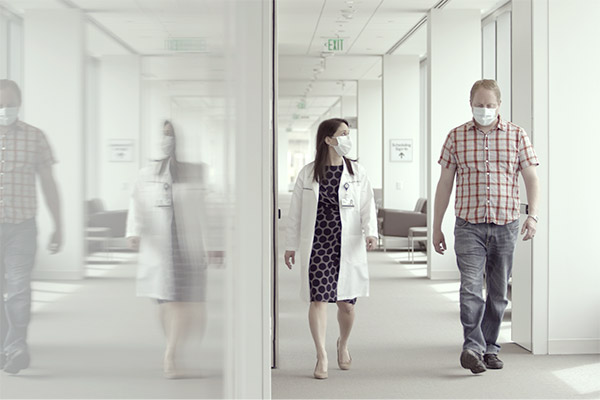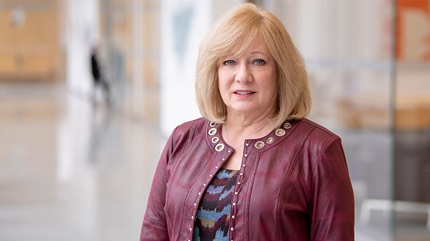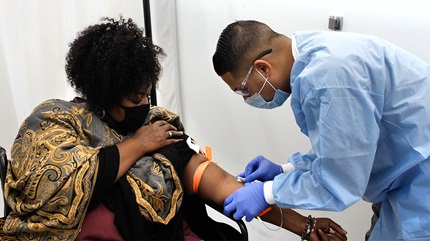Overview

Here at Cleveland Clinic Cancer Center, we understand the weight of a cancer diagnosis. Because of our vast expertise, we also understand the added weight of a diagnosis that is considered rare or uncommon.
At Cleveland Clinic, our multidisciplinary approach to rare cancers and blood diseases is designed to provide you with the expert opinions of highly sub-specialized medical and radiation oncologists, surgeons, radiologists and pathologists focused on ensuring you are diagnosed properly before receiving treatment.
We are experienced in treating patients with rare cancers and blood disorders, and that’s why you won’t hear us mentioning how uncommon your disease is. Instead, expect options and a clinical team experienced in caring for people with your particular diagnosis.
Cleveland Clinic is recognized in the U.S. and throughout the world for its expertise and care.
What We Treat
Cleveland Clinic Cancer Center offers patients the collective expertise of dozens of specialists who study, diagnose and treat uncommon diseases on a regular basis. While the below list represents many of these rare diseases, it is not a comprehensive list of what we treat. If you don’t see your diagnosis listed, please give us a call. We may still be able to help.
Solid Tumors
- Adrenocortical carcinoma
- Ampullary cancer
- Bladder cancer
- Squamous cell cancer of the bladder
- Small cell bladder cancer
- Adenocarcinoma of the bladder
- Sarcomatoid cancer of the bladder
- Chest wall sarcoma
- Angiosarcomas
- Askin's tumor
- Primary soft tissue sarcomas of the chest wall
- Radiation induced chest wall sarcomas
- Epithelioid hemangioendothelioma (EHE)
- Eye tumors
- Conjunctival squamous cell carcinoma of the eye
- Conjunctival melanoma of the eye
- Ocular lymphoma
- Ocular mets
- Orbital lymphoma
- Orbital tumors & mets
- Retinal hemangioma
- Retinoblastomas
- Uveal melanoma
- Gastrointestinal stromal tumor (GIST)
- Germ cell & stromal tumors of the ovary
- Gestational trophoblastic disease
- Gynecologic carcinoid tumors
- Merkel cell carcinoma
- Mesothelioma
- Pericardial Mesothelioma
- Peritoneal Mesothelioma
- Pleural Mesothelioma
- Testicular Mesothelioma
- Neuroendocrine Tumors
- Appendix neuroendocrine tumors
- Gynecologic small & large cell neuroendocrine tumors
- MEN Syndrome
- Pancreatic neuroendocrine tumors
- Rectal neuroendocrine tumors
- Small bowel neuroendocrine tumors
- Stomach neuroendocrine tumors
- Neuroendocrine tumor of the prostate
- Non-Clear cell kidney cancer
- Ovarian granulosa cell tumors
- Pagets disease of the vulva
- Salivary gland cancer
- Minor salivary gland cancer
- Parotid cancer
- Submandibular gland cancer
- Sinonasal cancer
- Small cell neuroendocrine carcinoma
- Thymic cancer
- Thyroid cancer
- Advanced differentiated thyroid cancer
- Anaplastic thyroid cancer
- Medullary thyroid cancer
- Upper tract urothelial carcinoma (UTUC)
- Renal pelvic cancer
- Ureteral cancer
- Uterine sarcomas
Hematologic disorders
- Amyloidosis (View more about our Amyloidosis Center)
- Atypical Chronic Myeloid Leukemia
- B-cell neoplasms
- CNS Lymphoma
- Hairy Cell Leukemia
- Lymphoplasmacytic lymphoma
- B-Cell prolymphocytic leukemia
- Blastic plasmacytoid dendritic cell neoplasm (BPDCN)
- Bone marrow failure and cytopenias
- Acquired
- Idiopathic aplastic anemia
- Idiopathic neutropenia
- Autoimmune neutropenia
- Amegakaryocytic thrombocytopenic purpura
- Pure red cell aplasia
- B19 parvovirus related/Transient aplastic crisis
- Paroxysmal nocturnal hemoglobinuria
- Large granular lymphocyte leukemia/lymphoproliferation
- NK-LGL
- T-LGL
- Congenital/inherited
- Congenital dyserythropoietic anemia
- Congenital amegakaryocytic thrombocytopenia (CAMT)
- Diamond Blackfan anemia (DBA)
- Dyskeratosis congenital
- Fanconi anemia
- Severe congenital neutropenia
- Cyclic neutropenia
- Shwachman-Diamond syndrome (SDS)
- Thrombocytopenia absent radii syndrome (TAR)
- Clonal Hematopoiesis Indeterminate potential (CHIP)
- Clonal cytopenias of undetermined significance (CCUS)
- Idiopathic cytopenia of undetermined significance (ICUS)
- Other rare myeloid disorders
- Castleman’s disease (CD)
- Unicentric CD
- Idiopathic multicentric CD (iMCD)
- iMCD-TAFRO
- POEMS-associated MCD
- HHV-8+ HIV+ MCD
- Chronic eosinophilic leukemia
- Chronic myeloid leukemia (CML)
- Dermopathies
- Hypereosinophilic syndrome (HES)
- Chronic neutrophilic leukemia
- Histiocytic disorders
- Langerhans cell histiocytosis
- Erdheim-Chester disease
- Rosai-Dorfman disease
- Follicular dendritic cell sarcoma (FDCS)
- Histiocytic sarcoma
- Interdigitating dendritic cell sarcoma
- Hemophagocytic lymphohistiocytosis (HLH)
- Macrophage-activation syndrome
- Monoclonal Gammopathy of Renal Significance (MGRS)
- Natural killer (NK) cell lymphoma/leukemia
- Plasma cell leukemia (PCL)
- POEMS Syndrome (Polyneuropathy, Organomegaly, Endocrinopathy, M-Protein, Skin Manifestations)
- T-cell neoplasms
- Peripheral T-cell lymphomas
- Primary cutaneous peripheral T-cell lymphomas
- T-Cell prolymphocytic leukemia
- Systemic mastocytosis
- Post-transplant lymphoproliferative disorder (PTLD)
Patient Services and Support
In addition to offering state of the art diagnostic techniques and treatment methods, our specialists also offer an array of resources that can help patients cope with the demands of cancer. Patients are encouraged to take advantage of these resources to ease the burden of managing cancer.
Clinical Trials and Research
Cleveland Clinic Cancer Center clinical trials offer patients access to the latest treatments and procedures resulting from cancer research.
For Medical Professionals
Cleveland Clinic Cancer Center is committed to working with you to provide the best care for your patients. Our team is also dedicated to the training and education of medical professionals to advance cancer care and research.
Referring a Patient
Outpatient Referrals
To refer a patient for an outpatient appointment at Cleveland Clinic Cancer Center, please call 216.444.7923 or 866.223.8100.
Make An Online Referral
To make a direct online referral to Cleveland Clinic Cancer Center, complete our Online Cancer Patient Referral Form or visit clevelandclinic.org/cancerpatientreferrals.
You will receive confirmation once the appointment is scheduled.
Inpatient Referrals
To arrange an inpatient hospital transfer, we ask that a physician call 800.553.5056.
Pathology Second Opinion
Cleveland Clinic Laboratories offers second opinion pathology consultations for surgical pathology, cytology, and hematopathology cases.
Cancer Advances Podcast
A Cleveland Clinic podcast for medical professionals exploring the latest innovative research and clinical advances in the field of oncology. Listen to Cancer Advances.
Consult QD | Cancer
Our cancer care blog for physicians and healthcare professionals. Discover emerging advances, innovations, and research insights from Cleveland Clinic Cancer Care specialists. Explore Consult QD.


